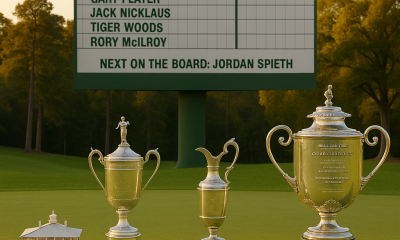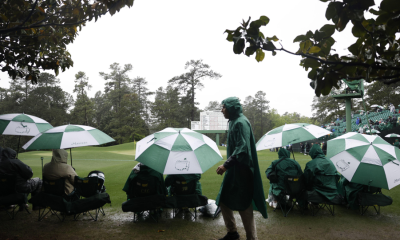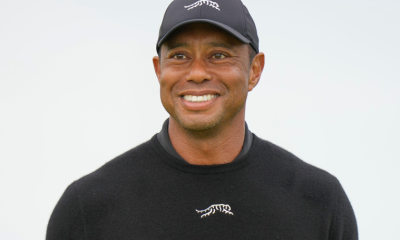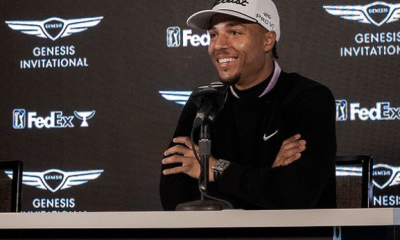Opinion & Analysis
In the shadow of greatness: Charlie Woods’ journey continues

The journey of Charlie Woods, son of the legendary golfer Tiger Woods, is a captivating tale watched closely by golf enthusiasts and casual observers. Navigating the path carved by one of the greatest golfers of all time is no easy feat, yet Charlie is doing so with admirable poise and determination. In my opinion, credit is due not just to Charlie’s talent and hard work but significantly to Tiger Woods, who has provided a remarkable balance of support and mentorship without crossing into the realms of helicopter parenting that is so prevalent in sports today.
As a young golfer, Charlie Woods finds himself under the immense weight of expectations that naturally follow being Tiger Woods’ son. However, Tiger’s approach to parenting and mentorship has been refreshing and commendable. He appears conscious of letting Charlie carve out his own identity within the game. Instead of reliving his own childhood through Charlie, Tiger is enabling his son to have experiences he never had the chance to enjoy.
One clear reflection of Tiger’s supportive yet non-overbearing approach is Charlie’s flourishing involvement in high school golf. He is playing for The Benjamin School, which proudly stands as the top-ranked team in the state of Florida, a testament to the school’s excellent golf program and Charlie’s role within it. Despite the pressure, Charlie is excelling and becoming a prominent figure on the team. His ability to engage in high school golf—a space Tiger once bypassed due to his accelerated journey into the professional realm—adds a layer of normalcy and youthful exuberance to Charlie’s formative years.


In a state as fiercely competitive as Florida, being the eighth-ranked high school golfer is no small feat. Golf in Florida is intensely competitive, with numerous young talents vying for attention and success. Yet, Charlie has managed to stand out not only through his lineage but by sheer merit, reinforcing that he is, indeed, one to watch in the golfing world. His current +4.2 handicap, achieved by posting only tournament scores, underscores his capability and dedication to the sport. These achievements reflect his skill, discipline, and relentless pursuit of excellence.
Much has been made of Charlie’s up-and-down performances in more spotlighted amateur events, such as the US Junior Amateur. The intense media attention and public scrutiny that follow him into these events are unfortunate burdens for such a young athlete. The pressure must be immense as he navigates these high-stakes competitions under critics and fans’ watchful eyes. Within the more relaxed environment of junior and high school golf, which is somewhat shielded from the harsh glare of media scrutiny, Charlie has been flourishing for some time. This suggests a profound need for both the media and public opinion to temper their expectations and give him the space to grow. After all, he’s a kid trying to figure out life, not just competitive golf.

Charlie at the 2024 US Junior Am earlier this year.
Tiger’s influence is undeniably present in Charlie’s journey, yet it is evident that there is a conscious effort to allow Charlie to develop independently. This can often be a fine line to tread, particularly in a sport where young talents can be overshadowed or unduly pressured by parents living vicariously through their children. Tiger’s parenting style seems to be one of guidance blended with the freedom to let Charlie make his own decisions and learn from them, thereby fostering genuine passion and resilience in his son.
Tiger’s readiness to support without overshadowing Charlie’s spotlight is a model worth emulating in sports and other arenas where parental support can often transition into pressure. Tiger Woods’s legacy undoubtedly casts a wide shadow, but in Charlie, there is a promise of a journey molded by talent, hard work, and an upbringing that values love, learning, and independence over perpetual victory.

Tiger and his cub at the PNC Championship.
Undoubtedly, Charlie Woods’s journey is a compelling narrative in the world of golf today. His high school achievements and individual skills promise a bright future, one that is illuminated by his own efforts just as much as by the guidance of his father. Tiger’s role as both a mentor and a supportive parent is pivotal in this narrative, highlighting the significant impact of balancing professional aspirations with a grounded, nurturing upbringing. As Charlie continues his journey under the spotlight, he does so not merely as “the son of a legend” but as a rising star in his own right, forging a unique path in the shadow of greatness.
Editor’s note: “My Take” will be an ongoing weekly series where Brendon shares his thoughts and opinions on various aspects of the game and industry. These are Brendon’s opinions and do not necessarily reflect those of GolfWRX, its staff, and its affiliates.
Opinion & Analysis
The 2 primary challenges golf equipment companies face

As the editor-in-chief of this website and an observer of the GolfWRX forums and other online golf equipment discourse for over a decade, I’m pretty well attuned to the grunts and grumbles of a significant portion of the golf equipment purchasing spectrum. And before you accuse me of lording above all in some digital ivory tower, I’d like to offer that I worked at golf courses (public and private) for years prior to picking up my pen, so I’m well-versed in the non-degenerate golf equipment consumers out there. I touched (green)grass (retail)!
Complaints about the ills of and related to the OEMs usually follow some version of: Product cycles are too short for real innovation, tour equipment isn’t the same as retail (which is largely not true, by the way), too much is invested in marketing and not enough in R&D, top staffer X hasn’t even put the new driver in play, so it’s obviously not superior to the previous generation, prices are too high, and on and on.
Without digging into the merits of any of these claims, which I believe are mostly red herrings, I’d like to bring into view of our rangefinder what I believe to be the two primary difficulties golf equipment companies face.
One: As Terry Koehler, back when he was the CEO of Ben Hogan, told me at the time of the Ft Worth irons launch, if you can’t regularly hit the golf ball in a coin-sized area in the middle of the face, there’s not a ton that iron technology can do for you. Now, this is less true now with respect to irons than when he said it, and is less and less true by degrees as the clubs get larger (utilities, fairways, hybrids, drivers), but there remains a great deal of golf equipment truth in that statement. Think about it — which is to say, in TL;DR fashion, get lessons from a qualified instructor who will teach you about the fundamentals of repeatable impact and how the golf swing works, not just offer band-aid fixes. If you can’t repeatably deliver the golf club to the golf ball in something resembling the manner it was designed for, how can you expect to be getting the most out of the club — put another way, the maximum value from your investment?
Similarly, game improvement equipment can only improve your game if you game it. In other words, get fit for the clubs you ought to be playing rather than filling the bag with the ones you wish you could hit or used to be able to hit. Of course, don’t do this if you don’t care about performance and just want to hit a forged blade while playing off an 18 handicap. That’s absolutely fine. There were plenty of members in clubs back in the day playing Hogan Apex or Mizuno MP-32 irons who had no business doing so from a ballstriking standpoint, but they enjoyed their look, feel, and complementary qualities to their Gatsby hats and cashmere sweaters. Do what brings you a measure of joy in this maddening game.
Now, the second issue. This is not a plea for non-conforming equipment; rather, it is a statement of fact. USGA/R&A limits on every facet of golf equipment are detrimental to golf equipment manufacturers. Sure, you know this, but do you think about it as it applies to almost every element of equipment? A 500cc driver would be inherently more forgiving than a 460cc, as one with a COR measurement in excess of 0.83. 50-inch shafts. Box grooves. And on and on.
Would fewer regulations be objectively bad for the game? Would this erode its soul? Fortunately, that’s beside the point of this exercise, which is merely to point out the facts. The fact, in this case, is that equipment restrictions and regulations are the slaughterbench of an abundance of innovation in the golf equipment space. Is this for the best? Well, now I’ve asked the question twice and might as well give a partial response, I guess my answer to that would be, “It depends on what type of golf you’re playing and who you’re playing it with.”
For my part, I don’t mind embarrassing myself with vintage blades and persimmons chasing after the quasi-spiritual elevation of a well-struck shot, but that’s just me. Plenty of folks don’t give a damn if their grooves are conforming. Plenty of folks think the folks in Liberty Corner ought to add a prison to the museum for such offences. And those are just a few of the considerations for the amateur game — which doesn’t get inside the gallery ropes of the pro game…
Different strokes in the game of golf, in my humble opinion.
Anyway, I believe equipment company engineers are genuinely trying to build better equipment year over year. The marketing departments are trying to find ways to make this equipment appeal to the broadest segment of the golf market possible. All of this against (1) the backdrop of — at least for now — firm product cycles. And golfers who, with their ~15 average handicap (men), for the most part, are not striping the golf ball like Tiger in his prime and seem to have less and less time year over year to practice and improve. (2) Regulations that massively restrict what they’re able to do…
That’s the landscape as I see it and the real headwinds for golf equipment companies. No doubt, there’s more I haven’t considered, but I think the previous is a better — and better faith — point of departure when formulating any serious commentary on the golf equipment world than some of the more cynical and conspiratorial takes I hear.
Agree? Disagree? Think I’m worthy of an Adam Hadwin-esque security guard tackle? Let me know in the comments.
@golfoncbs The infamous Adam Hadwin tackle ? #golf #fyp #canada #pgatour #adamhadwin ? Ghibli-style nostalgic waltz – MaSssuguMusic
Podcasts
Fore Love of Golf: Introducing a new club concept

Episode #16 brings us Cliff McKinney. Cliff is the founder of Old Charlie Golf Club, a new club, and concept, to be built in the Florida panhandle. The model is quite interesting and aims to make great, private golf more affordable. We hope you enjoy the show!
Opinion & Analysis
On Scottie Scheffler wondering ‘What’s the point of winning?’

Last week, I came across a reel from BBC Sport on Instagram featuring Scottie Scheffler speaking to the media ahead of The Open at Royal Portrush. In it, he shared that he often wonders what the point is of wanting to win tournaments so badly — especially when he knows, deep down, that it doesn’t lead to a truly fulfilling life.
View this post on Instagram
“Is it great to be able to win tournaments and to accomplish the things I have in the game of golf? Yeah, it brings tears to my eyes just to think about it because I’ve literally worked my entire life to be good at this sport,” Scheffler said. “To have that kind of sense of accomplishment, I think, is a pretty cool feeling. To get to live out your dreams is very special, but at the end of the day, I’m not out here to inspire the next generation of golfers. I’m not out here to inspire someone to be the best player in the world, because what’s the point?”
Ironically — or perhaps perfectly — he went on to win the claret jug.
That question — what’s the point of winning? — cuts straight to the heart of the human journey.
As someone who’s spent over two decades in the trenches of professional golf, and in deep study of the mental, emotional, and spiritual dimensions of the game, I see Scottie’s inner conflict as a sign of soul evolution in motion.
I came to golf late. I wasn’t a junior standout or college All-American. At 27, I left a steady corporate job to see if I could be on the PGA Tour starting as a 14-handicap, average-length hitter. Over the years, my journey has been defined less by trophies and more by the relentless effort to navigate the deeply inequitable and gated system of professional golf — an effort that ultimately turned inward and helped me evolve as both a golfer and a person.
One perspective that helped me make sense of this inner dissonance around competition and our culture’s tendency to overvalue winning is the idea of soul evolution.
The University of Virginia’s Division of Perceptual Studies has done extensive research on reincarnation, and Netflix’s Surviving Death (Episode 6) explores the topic, too. Whether you take it literally or metaphorically, the idea that we’re on a long arc of growth — from beginner to sage elder — offers a profound perspective.
If you accept the premise literally, then terms like “young soul” and “old soul” start to hold meaning. However, even if we set the word “soul” aside, it’s easy to see that different levels of life experience produce different worldviews.
Newer souls — or people in earlier stages of their development — may be curious and kind but still lack discernment or depth. There is a naivety, and they don’t yet question as deeply, tending to see things in black and white, partly because certainty feels safer than confronting the unknown.
As we gain more experience, we begin to experiment. We test limits. We chase extreme external goals — sometimes at the expense of health, relationships, or inner peace — still operating from hunger, ambition, and the fragility of the ego.
It’s a necessary stage, but often a turbulent and unfulfilling one.
David Duval fell off the map after reaching World No. 1. Bubba Watson had his own “Is this it?” moment with his caddie, Ted Scott, after winning the Masters.
In Aaron Rodgers: Enigma, reflecting on his 2011 Super Bowl win, Rodgers said:
“Now I’ve accomplished the only thing that I really, really wanted to do in my life. Now what? I was like, ‘Did I aim at the wrong thing? Did I spend too much time thinking about stuff that ultimately doesn’t give you true happiness?’”
Jim Carrey once said, “I think everybody should get rich and famous and do everything they ever dreamed of so they can see that it’s not the answer.”
Eventually, though, something shifts.
We begin to see in shades of gray. Winning, dominating, accumulating—these pursuits lose their shine. The rewards feel more fleeting. Living in a constant state of fight-or-flight makes us feel alive, yes, but not happy and joyful.
Compassion begins to replace ambition. Love, presence, and gratitude become more fulfilling than status, profits, or trophies. We crave balance over burnout. Collaboration over competition. Meaning over metrics.
Interestingly, if we zoom out, we can apply this same model to nations and cultures. Countries, like people, have a collective “soul stage” made up of the individuals within them.
Take the United States, for example. I’d place it as a mid-level soul: highly competitive and deeply driven, but still learning emotional maturity. Still uncomfortable with nuance. Still believing that more is always better. Despite its global wins, the U.S. currently ranks just 23rd in happiness (as of 2025). You might liken it to a gifted teenager—bold, eager, and ambitious, but angsty and still figuring out how to live well and in balance. As much as a parent wants to protect their child, sometimes the child has to make their own mistakes to truly grow.
So when Scottie Scheffler wonders what the point of winning is, I don’t see someone losing strength.
I see someone evolving.
He’s beginning to look beyond the leaderboard. Beyond metrics of success that carry a lower vibration. And yet, in a poetic twist, Scheffler did go on to win The Open. But that only reinforces the point: even at the pinnacle, the question remains. And if more of us in the golf and sports world — and in U.S. culture at large — started asking similar questions, we might discover that the more meaningful trophy isn’t about accumulating or beating others at all costs.
It’s about awakening and evolving to something more than winning could ever promise.






















Donald Trump
Nov 26, 2024 at 5:20 pm
Well this article is a lot better than your last one on bringing woke DEI ideologies to the golf course. Thank God for that. I see you removed the comments from that article; interesting how one likes to throw out their opinion yet when others disagree with them and state theirs, the author just eliminates their freedom of speech by removing the posts from the website entirely. Typical liberal behavior.
John Coctostan
Nov 16, 2024 at 4:04 pm
Where do they find these “writers”? Charlie Woods is ranked 1,001 in the AJGA rankings, and has not broken par in a single tournament round in 2024. A +4.2 index? Please…
Ronald Montesano
Nov 11, 2024 at 8:59 pm
Fairly certain that Tiger played high school golf.
https://www.abebooks.com/servlet/BookDetailsPL?bi=31980385661&searchurl=ds%3D20%26kn%3Dtiger%2Bwoods%2Bmade%2Bme%2Blook%2Blike%26rollup%3Don%26sortby%3D17&cm_sp=snippet-_-srp0-_-title1
BIG1
Nov 10, 2024 at 5:26 am
Another ass kissing Woods piece. The kid is not even a top ranked JR.
George
Nov 9, 2024 at 7:34 am
Typical ass kissing of Woods. Little Charlie will never get a tour card. High school golf means nothing. He isn’t even a top ranked JR.